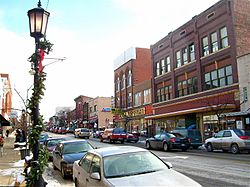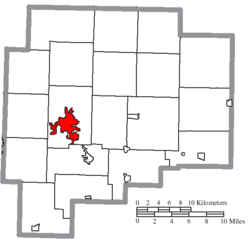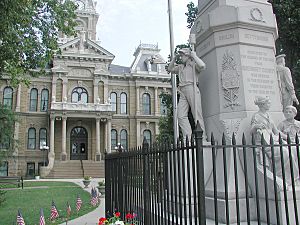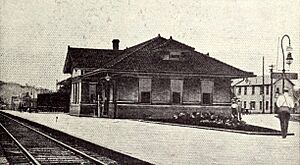Cambridge, Ohio facts for kids
Quick facts for kids
Cambridge, Ohio
|
|
|---|---|

Downtown Cambridge in 2008
|
|

Location of Cambridge in Guernsey County, Ohio
|
|
| Country | United States |
| State | Ohio |
| County | Guernsey |
| First Settled | 1798 |
| Incorporated | 1837 |
| Area | |
| • Total | 6.37 sq mi (16.50 km2) |
| • Land | 6.37 sq mi (16.49 km2) |
| • Water | 0.00 sq mi (0.01 km2) |
| Elevation | 846 ft (258 m) |
| Population
(2020)
|
|
| • Total | 10,089 |
| • Estimate
(2023)
|
9,969 |
| • Density | 1,584.33/sq mi (611.73/km2) |
| Time zone | UTC-5 (Eastern (EST)) |
| • Summer (DST) | UTC-4 (EDT) |
| ZIP codes |
43725, 43750
|
| Area code(s) | 740 |
| FIPS code | 39-10996 |
| GNIS feature ID | 2393504 |
| Website | City of Cambridge |
Cambridge (say "kaym-brij") is a city in Ohio, United States. It is the main city of Guernsey County. Cambridge is located in southeastern Ohio, within the Appalachian Mountains. It is about 75 miles (121 km) east of Columbus. The city is also about 124 miles (200 km) south of Cleveland.
In 2020, about 10,089 people lived in Cambridge. The city is a key spot because two major highways, I-70 and I-77, meet there. Cambridge is also famous for its glass factories, like Cambridge Glass and Mosser Glass. You can also see special S-shaped bridges here. These bridges were built way back in 1828 for the National Road.
Contents
History of Cambridge
The story of Cambridge began in 1796. A man named Colonel Ebenezer Zane was given money to build a road through the Ohio wilderness. This road was called Zane's Trace. In 1798, a ferry was set up where Zane's Trace crossed Wills Creek.
The first bridge in the area was built in 1803. The land where Cambridge now stands was given to Zaccheus Biggs and Zaccheus Beatty in 1801. A small settlement started to grow around the creek crossing. The town of Cambridge was officially planned in 1806.
Some historians think the town was named after Cambridge, Maryland or Cambridge, Massachusetts. Also in 1806, a group of early settlers from the Isle of Guernsey in England stopped here. They decided to stay, and later, the county was named Guernsey in their honor. In 1828, the important National Road came through Cambridge. The first railroad arrived in 1854.
Geography and Climate
Cambridge is located along Wills Creek. Another stream, Leatherwood Creek, flows into Wills Creek in the southern part of the city. The city covers a total area of about 6.35 square miles (16.45 square kilometers). All of this area is land.
Cambridge Weather
| Climate data for Cambridge, Ohio (1991–2020 normals, extremes 1963–present) | |||||||||||||
|---|---|---|---|---|---|---|---|---|---|---|---|---|---|
| Month | Jan | Feb | Mar | Apr | May | Jun | Jul | Aug | Sep | Oct | Nov | Dec | Year |
| Record high °F (°C) | 74 (23) |
79 (26) |
85 (29) |
92 (33) |
97 (36) |
99 (37) |
102 (39) |
99 (37) |
96 (36) |
92 (33) |
80 (27) |
77 (25) |
102 (39) |
| Mean daily maximum °F (°C) | 38.2 (3.4) |
42.3 (5.7) |
52.8 (11.6) |
66.2 (19.0) |
75.0 (23.9) |
82.0 (27.8) |
85.1 (29.5) |
84.0 (28.9) |
77.8 (25.4) |
66.1 (18.9) |
53.2 (11.8) |
42.4 (5.8) |
63.8 (17.7) |
| Daily mean °F (°C) | 29.4 (−1.4) |
32.4 (0.2) |
41.6 (5.3) |
53.2 (11.8) |
62.6 (17.0) |
70.3 (21.3) |
73.9 (23.3) |
72.5 (22.5) |
65.7 (18.7) |
54.1 (12.3) |
42.9 (6.1) |
34.0 (1.1) |
52.7 (11.5) |
| Mean daily minimum °F (°C) | 20.7 (−6.3) |
22.6 (−5.2) |
30.3 (−0.9) |
40.2 (4.6) |
50.2 (10.1) |
58.5 (14.7) |
62.7 (17.1) |
60.9 (16.1) |
53.7 (12.1) |
42.2 (5.7) |
32.6 (0.3) |
25.7 (−3.5) |
41.7 (5.4) |
| Record low °F (°C) | −32 (−36) |
−16 (−27) |
−3 (−19) |
8 (−13) |
23 (−5) |
30 (−1) |
42 (6) |
37 (3) |
32 (0) |
18 (−8) |
0 (−18) |
−17 (−27) |
−32 (−36) |
| Average precipitation inches (mm) | 3.25 (83) |
2.41 (61) |
3.27 (83) |
3.84 (98) |
4.23 (107) |
4.46 (113) |
4.04 (103) |
3.49 (89) |
3.47 (88) |
2.87 (73) |
3.00 (76) |
2.99 (76) |
41.32 (1,050) |
| Average snowfall inches (cm) | 5.5 (14) |
5.3 (13) |
3.1 (7.9) |
0.0 (0.0) |
0.0 (0.0) |
0.0 (0.0) |
0.0 (0.0) |
0.0 (0.0) |
0.0 (0.0) |
0.0 (0.0) |
0.5 (1.3) |
3.0 (7.6) |
17.4 (44) |
| Average precipitation days (≥ 0.01 in) | 13.4 | 11.1 | 11.7 | 12.9 | 13.1 | 12.4 | 10.9 | 9.0 | 9.1 | 9.9 | 10.1 | 12.0 | 135.6 |
| Average snowy days (≥ 0.1 in) | 4.1 | 2.8 | 1.5 | 0.0 | 0.0 | 0.0 | 0.0 | 0.0 | 0.0 | 0.0 | 0.4 | 2.2 | 11.0 |
| Source: NOAA | |||||||||||||
People of Cambridge
| Historical population | |||
|---|---|---|---|
| Census | Pop. | %± | |
| 1840 | 766 | — | |
| 1850 | 1,041 | 35.9% | |
| 1860 | 1,452 | 39.5% | |
| 1870 | 2,193 | 51.0% | |
| 1880 | 2,883 | 31.5% | |
| 1890 | 4,361 | 51.3% | |
| 1900 | 8,241 | 89.0% | |
| 1910 | 11,327 | 37.4% | |
| 1920 | 13,104 | 15.7% | |
| 1930 | 16,129 | 23.1% | |
| 1940 | 15,044 | −6.7% | |
| 1950 | 14,739 | −2.0% | |
| 1960 | 14,652 | −0.6% | |
| 1970 | 13,656 | −6.8% | |
| 1980 | 13,450 | −1.5% | |
| 1990 | 11,748 | −12.7% | |
| 2000 | 11,520 | −1.9% | |
| 2010 | 10,635 | −7.7% | |
| 2020 | 10,089 | −5.1% | |
| 2023 (est.) | 9,969 | −6.3% | |
| U.S. Decennial Census | |||
Population in 2020
In 2020, Cambridge had 10,089 people living in 4,568 households. About 26% of these households had children under 18. Many households were families, including married couples and single-parent homes. The average age in the city was about 39.9 years old. About 22.2% of the people were under 18. Also, 20.1% were 65 years or older.
Population in 2010
In 2010, there were 10,635 people in Cambridge. There were 4,651 households. About 30.3% of households had children under 18. The average age was 38.8 years. About 24.6% of residents were under 18. About 17.3% were 65 or older.
Getting Around Cambridge
Cambridge is a key meeting point for two major highways: Interstate 70 and Interstate 77. Both highways have exits that lead right into the city center. U.S. Route 22 and U.S. Route 40 also run through Cambridge. These routes act like the city's main street.
For air travel, Cambridge has the Cambridge Municipal Airport. This airport is mostly used for smaller planes. If you need to fly on a commercial airline, the closest airport is Mid-Ohio Valley Regional Airport. For flights across the country, John Glenn Columbus International Airport is the nearest option.
Schools and Learning
The Cambridge City School District runs the public schools in the city. There is one primary school for younger students (grades K-2). There is also an intermediate school (grades 3-5) and a middle school. Older students attend Cambridge High School. For those who prefer a private school, St. Benedict Elementary School is a Roman Catholic school. The Guernsey County Public Library has two libraries in Cambridge. They offer books and resources for everyone.
Famous People from Cambridge
Many interesting people have connections to Cambridge!
- William Lawrence Boyd was an actor. He played the famous cowboy character Hopalong Cassidy in many movies.
- Dom Capers is a well-known football coach. He has been a defensive coordinator for several NFL teams. These include the Green Bay Packers and Miami Dolphins. He was also the first head coach for the Houston Texans.
- Doug Donley played as a wide receiver for the Dallas Cowboys. He also played for the Chicago Bears.
- Tom Eyen was a playwright and lyricist. He wrote the musical Dreamgirls. He won a Tony Award for it in 1981.
- Geno Ford was a great basketball player and coach. He played for Ohio University and coached at Kent State.
- John Glenn was a very famous NASA astronaut. He was the first American to orbit Earth! He was also a United States Senator and a veteran of World War II and the Korean War.
- Lisa Howard was an actress and journalist.
- William Oxley Thompson was the fifth president of Ohio State University.
See also
 In Spanish: Cambridge (Ohio) para niños
In Spanish: Cambridge (Ohio) para niños
 | George Robert Carruthers |
 | Patricia Bath |
 | Jan Ernst Matzeliger |
 | Alexander Miles |





